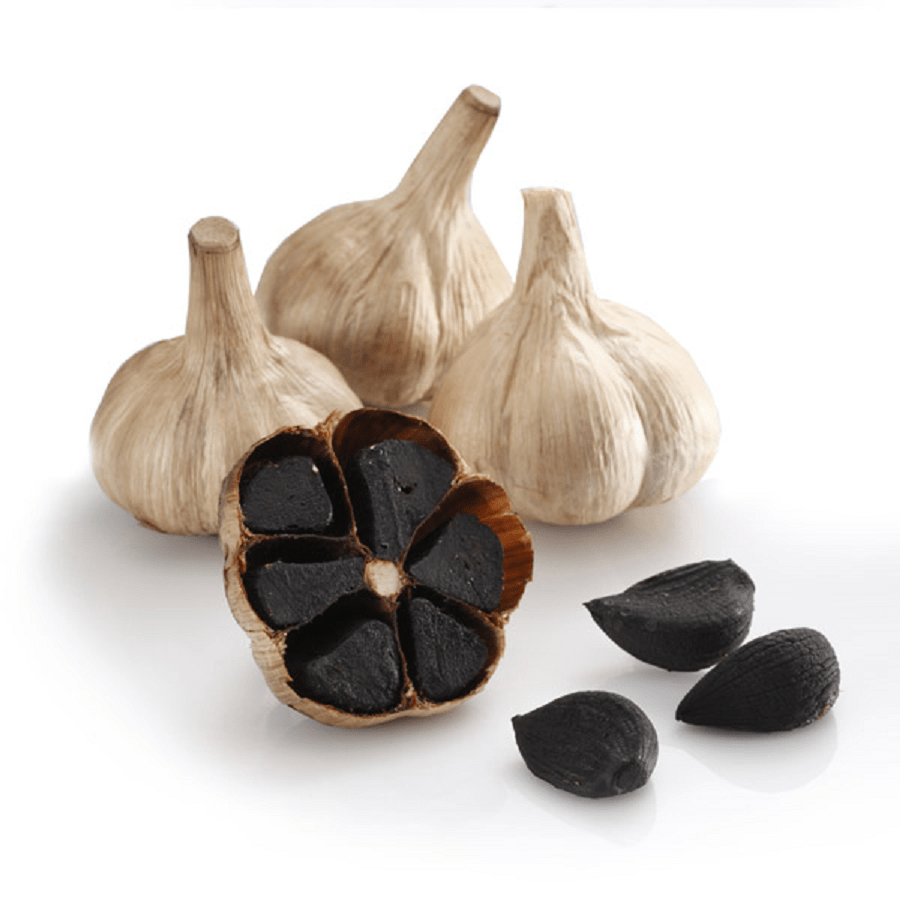Черен чесън
Allium sativum L. – Alliaceae

Ферментиралият чесън се получава чрез процес на ферментация, чрез излагане на пресен чесън на повишена температура и нива на влажност за по-дълъг период от време. По време на процеса на ферментация вътре в чесъна протичат голям брой химични (предимно реакцията на Мейлард) и ензимни реакции, които водят до промяна на цвета му (от бял на тъмен/черен), промяна на вкуса (става сладко-кисел ) и характерната остра миризма се губи. Също така, ферментацията увеличава наличието на полифеноли и флавоноиди, които са основните носители на антиоксидантни свойства. Освен това нестабилният алиин се превръща в стабилния S(+)-алил цистеин, който се счита за най-разпространеното биоактивно вещество и на което се приписват следните ползи за здравето:

1. Мощен антиоксидант;
2. Предотвратява възпалителни процеси (противовъзпалително действие);
3. Подобрява липидния статус (намалява затлъстяването);
4. Предпазва сърцето и кръвоносните съдове (кардиопротективно действие);
5. Повлиява регенерацията и защитата на черния дроб (хепатопротективен ефект);
6. Понижава кръвната захар (хипогликемично действие);
7. Потиска растежа на туморните клетки (антитуморен ефект);
8. Защитава и регенерира нервните клетки (невропротективно и неврорегенеративно действие);
Препратки
- Black Garlic Improves Heart Function in Patients With Coronary Heart Disease by Improving Circulating Antioxidant Levels
- The Effect of Black Garlic (Allium sativum Linn) on Cardiac and Aortic Histopathology in Experimental Studies in Obesity Rats
- Effects of an Optimized Aged Garlic Extract on Cardiovascular Disease Risk Factors in Moderate Hypercholesterolemic Subjects: A Randomized, Crossover, Double-Blind, Sustainedand Controlled Study
- In vitro studies of an aged black garlic extract enriched in S-allylcysteine and polyphenols with cardioprotective effects
- Black Garlic and Its Bioactive Compounds on Human Health Diseases: A Review
- Impact of steaming pretreatment process on characteristics and antioxidant activities of black garlic (Allium sativum L.)
- Modulation of local and systemic immune responses by fermented garlic extract
- Immune Competence and Minimizing Susceptibility to COVID-19 and Other Immune System Threats
- Chloroform extract of aged black garlic attenuates TNF-α-induced ROS generation, VCAM-1 expression, NF-κB activation and adhesiveness for monocytes in human umbilical vein endothelial cells
- The effects of allium sativum on immunity within the scope of COVID-19 infection
- Garlic (Allium sativum L.): a potential unique therapeutic food rich in organosulfur and flavonoid compounds to fight with COVID-19
- Herbal and Natural Dietary Products: Upcoming Therapeutic Approach for Prevention and Treatment of Hepatocellular Carcinoma
- Dietary Natural Products for Prevention and Treatment of Liver Cancer
- Black Garlic and Its Bioactive Compounds on Human Health Diseases: A Review
- Neuroprotection by spice-derived nutraceuticals: you are what you eat!
- Protective effects of functional foods against Parkinson’s disease: A narrative review on pharmacology, phytochemistry, and molecular mechanisms
- Gastroprotective effect of garlic in indomethacin induced gastric ulcer in rats
- The Protective Effect of Aged Garlic Extract on Nonsteroidal Anti-Inflammatory Drug-Induced Gastric Inflammations in Male Albino Rats
- Onion and garlic intake and the odds of benign prostatic hyperplasia
- Potential of S-Allyl Cysteine, a Major Bioactive Component of Garlic, As Hypoglycemic and Hypolipidemic Agent
- Lactobacillus bulgaricus improves antioxidant capacity of black garlic in the prevention of gestational diabetes mellitus: a randomized control trial
- Effect of Garlic and Aged Black Garlic on Hyperglycemia and Dyslipidemia in Animal Model of Type 2 Diabetes Mellitus
- Antioxidant effect of garlic and aged black garlic in animal model of type 2 diabetes mellitus
